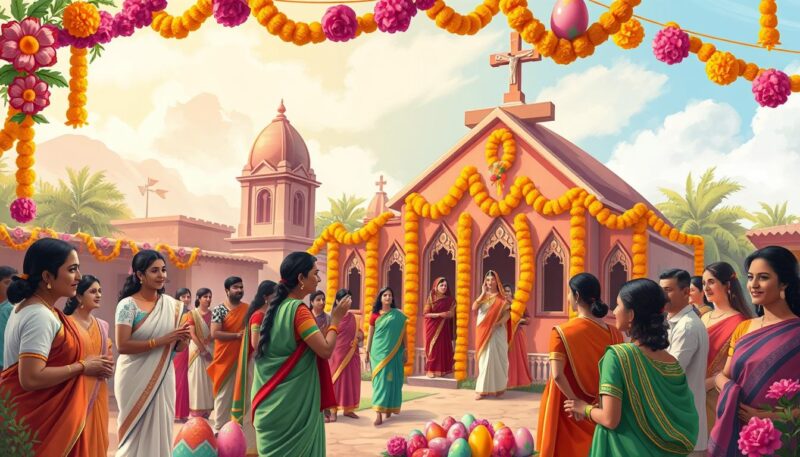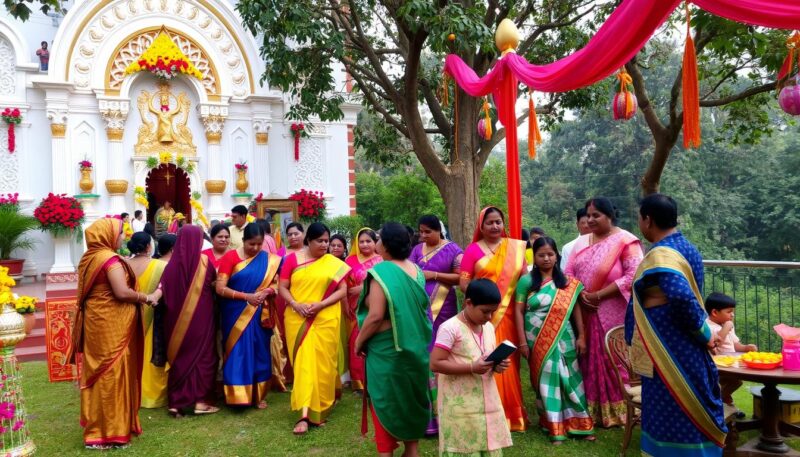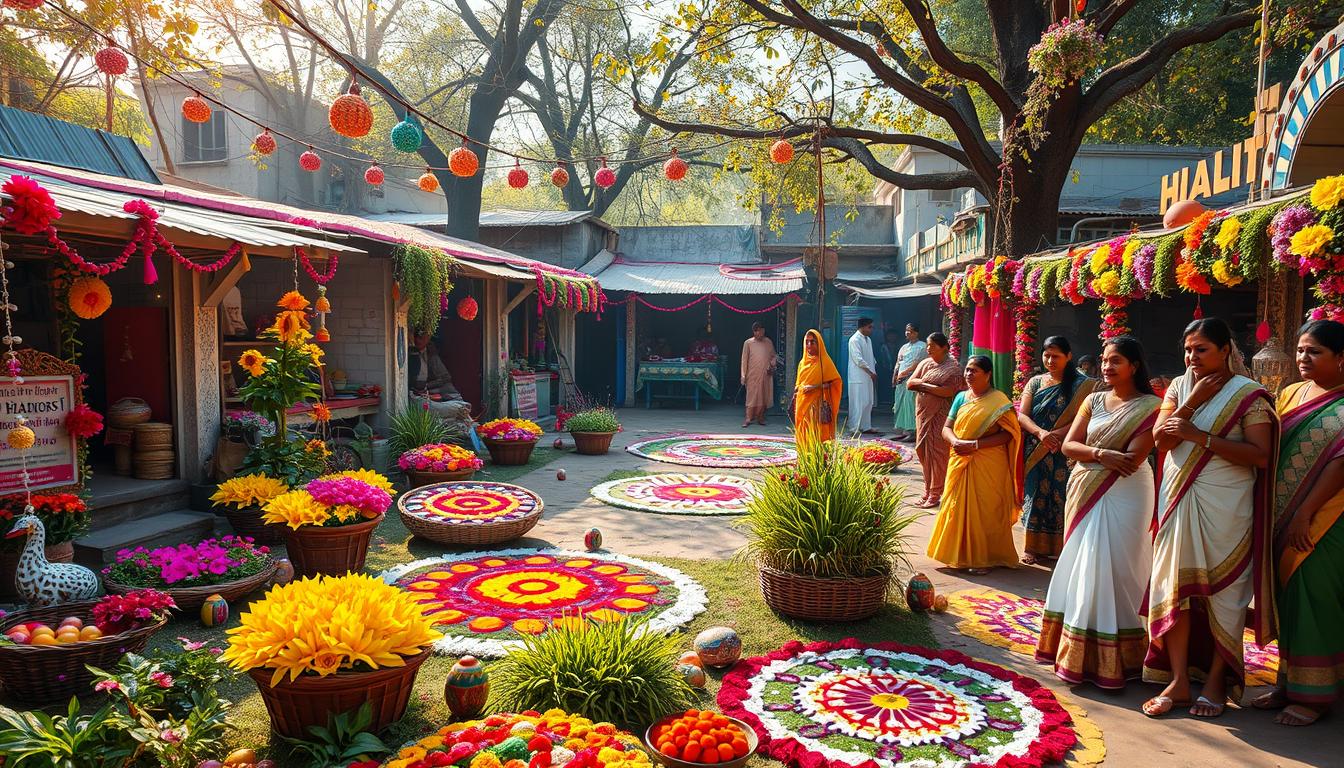Easter, marking the resurrection of Jesus, holds profound significance in Christian faith and is celebrated with deep religiosity in India, a country known for its diverse cultural festivals. Unlike the more commercialized Christmas, Easter embodies the Christian doctrine of redemption. Interestingly, the term “Easter” is derived from Eostre, a pre-Christian goddess in England. Recognized globally by Christians, Easter’s date may vary annually but it consistently symbolizes a promise of new life, akin to blooming flowers in spring.
In India, the celebration of Easter merges spiritual observance with rich regional culinary traditions. Post-Lenten feasting takes center stage, showcasing a variety of regional delicacies. Kerala, Goa, and North-East India each present unique food customs that are integral to their Easter celebrations. This festival is not just a reflection of faith but also mirrors India’s pluralistic society, where interfaith celebrations are common.
Key Takeaways
- Easter is celebrated with deep religiosity and cultural richness in India.
- States like Kerala and Goa have distinctive Easter culinary traditions.
- Easter follows a period of 40 days of Lent, marked by abstinence and fasting.
- In Kerala, dishes like Appams and Tender Coconut Pudding are popular.
- Goan Easter includes dishes like Pork Vindaloo and Chicken Cafreal.
- Nagaland and Mizoram emphasize community unity during their Easter feasts.
- Christianity is India’s third-largest religion, with significant populations in various states.
The Historical Roots of Christianity in India
The history of Easter in India is profoundly tied to the roots of Christianity in India, which dates back thousands of years. One of the most significant events was the arrival of Saint Thomas the Apostle in Kerala in 52 AD. His mission laid the foundation for one of the oldest Christian communities in the world.
Saint Thomas the Apostle
Saint Thomas the Apostle, known for his direct contact with Jesus Christ, is credited with bringing Christianity to India. According to tradition, he reached the Malabar Coast and evangelized among the local Jewish and Brahmin communities. His legacy endures through the Saint Thomas Christians, who uphold the practices and traditions established during his time. Despite the geographical and cultural changes over centuries, these communities have remained steadfast in their faith.
The Early Christian Communities
By the 6th century AD, the Christian population in the Malabar region flourished with a distinct identity, embracing Nestorian traditions. This period marked the formation of deeply rooted practices that influenced the history of Easter in India. The arrival of Portuguese explorers in the 15th century introduced Western denominations which further diversified the Christian landscape in India. The introduction of missionary education systems also played a pivotal role in societal changes. Despite experiencing targeted religious intolerance, the Christian community has shown remarkable resilience.
The enduring presence of Christianity in India amidst a predominantly Hindu society illustrates the ability of these communities to blend various cultural elements while maintaining their spiritual heritage.
| Event | Year | Significance |
|---|---|---|
| Arrival of Saint Thomas | 52 AD | Introduced Christianity in India |
| Formation of Early Christian Communities | 6th Century AD | Nestorian traditions established |
| Portuguese Arrival | 15th Century AD | Diversified Christian denominations in India |
Easter Celebrations Across India
Easter in India is a vibrant confluence of cultural and religious festivities, manifesting the unique traditions of various regions that highlight the country’s diverse Christian community. Indian Christian festivals, including Easter, are celebrated with enthusiastic participation across distinct states, each adding its regional flavor to the observance.
Kerala: The Heartland of Indian Christianity
Kerala’s Christian traditions are deeply rooted, with Easter being one of the most significant festivals. Christians in Kerala observe Holy Week with solemn church services, leading up to the grand celebration of Easter Sunday. Post-Sunday morning mass, families gather to enjoy a feast featuring beloved dishes such as Appams and Vattayappam, both incorporating the state’s staple ingredient, coconut. The vibrant cultural essence embodies the rich tapestry of Kerala’s Christian traditions.
Goa: Blending Portuguese Influences
Goa, known for its Portuguese heritage, becomes a focal point for regional Easter celebrations in India. The Our Lady Immaculate Conception Church in Panjim attracts large crowds for Easter services. Traditional Goan Christian cuisine, influenced by Portugal, includes meats marinated in alcohol and dishes like Vindaloo. Colorful carnivals, street plays, songs, dances, and lantern exchanges mark the festivities, making Goa a top destination for Easter celebrations in India.

North-East India: A Rich Christian Presence
The Northeastern states of India, including Mizoram, Nagaland, and Meghalaya, boast significant Christian populations. These states engage in various activities such as special services, baptisms, Easter egg hunts, and local folk song performances. Regional Easter celebrations in India in these areas reflect the blend of tribal traditions and Christian rituals, showcasing dishes like pork curry with local herbs, highlighting the gastronomic diversity that enriches the Easter experience.
From Kerala’s Christian traditions to Goa’s Portuguese-influenced celebrations and the festive fervor in North-East India, Indian Christian festivals weave a rich mosaic of cultural and religious diversity, making Easter a truly unique celebration across the subcontinent.
Do Indians Celebrate Easter? An Insight into Indian Festivities
When discussing Easter customs in India, it’s crucial to recognize the country’s religious diversity. Easter is one of the prominent Indian Christian festivals celebrated with both religious solemnity and cultural fervor. The vibrant traditions of Easter celebrations reflect a beautiful blend of devout practices and joyous festivities.
Religious Practices: Church Services and Masses
The foundation of Easter customs in India lies in the religious practices that mark this holy day. Church services and masses are held in various regional languages such as Malayalam, Hindi, and Urdu. In Kerala, night-long prayers and special church services are a testament to the faith’s deep roots. Similarly, Northeastern states like Nagaland and Mizoram witness elaborate church rituals encompassing traditional dances and hymns. Goa, with its Portuguese influence, sees the faithful attending masses that are as much about worship as a cultural communion.
Feasting and Cultural Celebrations
The rich cultural diversity in India manifests in the way Easter is celebrated across different states. In Kerala, community feasts following church services feature dishes such as Kozhukatta and Kaippuneeru. In Goa, Easter is synonymous with colorful carnivals and feasts, prominently highlighting the spicy delicacy, Sorpotel. The Northeastern regions showcase unique traditions where the community comes together for traditional dances, music, and indigenous rituals. These celebrations highlight the unique way Easter customs in India bring together religious observance and cultural expression.
The religious diversity in India allows for a hearty celebration of Easter that is both unique and relatable, making it a significant part of the country’s festive landscape. From solemn church services to vibrant feasting and community gatherings, Easter customs in India beautifully illustrate how Indian Christian festivals have become intertwined with the nation’s rich cultural tapestry.
Easter Traditions Unique to Indian Christians
Indian Christians celebrate Easter with a fascinating blend of local and global customs, creating a unique tapestry of traditions. From the intricate decoration of Easter eggs, reminiscent of East European customs, to the preparation of regional delicacies, the traditions of Indian Christianity stand out in their distinctiveness.

With only 2.5% of the total populace, the Christian community in India makes elaborate arrangements for Easter, particularly in regions like Goa, Mumbai, and the Northeastern states. Goa, renowned as one of India’s best Easter holiday destinations, comes alive with street plays, songs, dances, and colorful carnivals during the festivities.
Food plays a significant role in the celebration of Easter across India, showcasing the country’s culinary diversity. Easter food traditions in India vary significantly by region:
- In Mumbai, historic East Indian customs included eating duck and rabbit for Easter, though now pork has become prominent. Families indulge in dishes like pork sorpotel and pork sambari, often paired with fugias or chittiaps.
- North Indian Christians savor chicken and mutton dishes, flavored with local spices. Punjabi Christians typically enjoy a hefty meal of meat aloo curry, jeera pulao, and halwa for dessert.
- Kerala’s Syrian Christians prepare a variety of meats, including chicken or mutton mappas, beef ularthiyathu, and duck cooked with coconut milk and mild spices. Central Travancore Christians accompany these dishes with vattayappams.
- Anglo-Indians in Bengal start Easter with buffarth, a chicken stew served with bread, and may enjoy a desi organic roast chicken. The celebration also includes sweets like payesh and pathishapta.
These unique Indian Easter customs not only reflect the integration of global influences but also highlight local flavors and ingredients. The diversity in the traditions of Indian Christianity is evident as each community integrates their cultural nuances into the Easter celebrations.
| Region | Traditional Easter Dishes |
|---|---|
| Mumbai | Pork sorpotel, pork sambari, fugias, chittiaps |
| North India | Chicken and mutton dishes, meat aloo curry, jeera pulao, halwa |
| Kerala | Chicken or mutton mappas, beef ularthiyathu, pork peralan, vattayappams |
| Bengal | Buffarth, desi organic roast chicken, payesh, pathishapta |
From savoring traditional delicacies to engaging in colorful festivities, Indian Christians have preserved unique Indian Easter customs that deepen the cultural richness of their faith. The local adaptation of global Easter practices vividly demonstrates the enduring influence of Christianity on Indian traditions.
Conclusion
Understanding Indian Christianity provides a unique lens into the diverse tapestry of Indian culture. Easter celebrations among Indian Christians highlight the profound impact Christianity has had on the traditional practices in India. This annual event, falling on the first Sunday after the first full moon following the spring equinox, portrays a vivid blend of religious devotion and local culture.
The historical presence of Christianity in India, dating back to Saint Thomas the Apostle, has fostered a rich tradition of Easter festivities that span the country. In states like Kerala and Goa, you find celebrations infused with local customs and flavors, while the Christian communities of North-East India enliven their faith with vibrant cultural expressions. Church services, mass gatherings, and feasts mark the core of these Easter festivities, each reflecting the distinct heritage of the region.
Easter’s essence of renewal and hope resonates deeply within Indian Christians, mirroring the global fervor while embodying a uniquely Indian touch. Whether it’s the liturgical services, shared meals, or the joyful exchanges of Easter greetings, the celebrations underscore the harmonious coexistence of faiths in India. As you delve into the Easter traditions of Indian Christians, you’ll witness a compelling narrative of adaption and unity, one that enriches the broader landscape of Indian culture and exemplifies the pluralistic spirit of the nation.
FAQ
Do Indians celebrate Easter?
Yes, Indians celebrate Easter with significant enthusiasm, blending religious observance with vibrant cultural festivities. The celebration is a reflection of India’s pluralistic society, where Christian traditions are honored alongside local customs.
What is the historical significance of Christianity in India?
Christianity in India dates back to 52 AD with the arrival of Saint Thomas the Apostle in Kerala. His evangelism established deep-rooted Christian communities, particularly the Saint Thomas Christians, who continue to thrive to this day.
How do Christians in Kerala celebrate Easter?
In Kerala, Easter celebrations include church services and masses in regional languages, as well as festive feasting featuring traditional dishes like coconut-infused Appams and Vattayappam, which reflect the state’s unique culinary identity.
What are some unique Easter traditions among Indian Christians?
Unique Easter traditions among Indian Christians include the artistic decoration of eggs, incorporation of regional culinary flavors like the Tender Coconut Pudding, and the adaptation of global customs to reflect indigenous cultural practices.
How did Portuguese influence shape Easter celebrations in Goa?
Portuguese influence in Goa introduced Western culinary traditions, which blended with local flavors to create unique Easter dishes such as Vindaloo and meat softened with alcohol. These dishes form an integral part of Goan Easter feasts.
What are some Easter customs in North-East India?
In North-East India, states like Nagaland, Mizoram, and Meghalaya celebrate Easter with church services and community feasting. Unique regional dishes, including pork curry with local herbs, showcase the rich culinary diversity of these Christian-majority states.
What role do church services play in Indian Easter celebrations?
Church services and masses are central to Easter celebrations among Indian Christians. Conducted in various regional languages, these services commemorate the resurrection of Jesus and are integral to the religious observance of Easter.
How does Easter signify the cultural fusion in Indian Christian traditions?
Easter in India is a testament to the cultural fusion within Indian Christian traditions. The festival combines global Christian practices with local customs, creating a unique blend that reflects the broader tapestry of India’s religious diversity.
What is the significance of Easter in Indian culture?
Easter holds profound significance in Indian culture, symbolizing renewal and hope. It is a time for communities to come together in shared joy, signifying the end of Lent and celebrating the resurrection of Jesus with a mix of religious and cultural traditions.
How has Christianity impacted Indian cultural traditions?
Christianity has profoundly impacted Indian cultural traditions, introducing new ways of worship and community celebration. This influence is evident in various aspects of Indian life, including education, culinary practices, and the observance of Christian festivals like Easter.
Are there challenges faced by Indian Christians today?
Despite contemporary challenges such as religious intolerance, Indian Christians continue to practice their faith with resilience. Their celebrations, including Easter, highlight their ability to maintain religious traditions while assimilating into the broader Indian society.
Source Links
- http://indianculture.gov.in/food-and-culture/food-festivals/easter-harbinger-new-life-and-hope
- https://en.wikipedia.org/wiki/Christianity_in_India
- https://www.history.com/news/resurrection-stories-ancient-cultures
- https://www.cfcindia.com/article/the-truth-about-christmas-and-easter
- https://www.india-tours.com/fairs-and-festivals/easter-festival.html
- https://www.eastergoodfriday.com/easter-and-good-friday-in-india.html
- https://globeaware.org/news/globe-aware-news/1888-celebration-of-easter-in-asian-countries-with-tradition-and-rituals
- https://mauvegroup.com/innovation-hub/blog/easter-and-springtime-traditions-around-the-world
- https://timesofindia.indiatimes.com/city/kochi/the-unique-traditions-of-easter-in-kerala/articleshow/63534475.cms
- https://festivals.iloveindia.com/easter/traditions/easter-in-india.html
- https://www.thehindu.com/life-and-style/food/what-india-feasts-on-for-easter/article26876368.ece
- https://www.sahapedia.org/easter-india
- https://stratfordcrier.com/holidays-of-april-easter-passover-ramadan-and-vishu-baisakhi/
- https://www.pincodify.com/blog/indian-holiday-calender/easter-sunday

